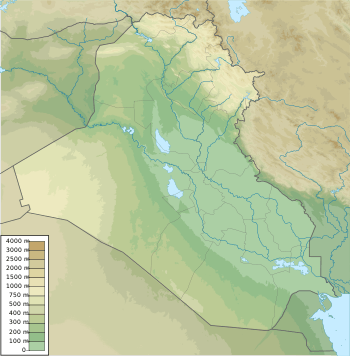1991 uprising in Kirkuk
The 1991 uprising in Kirkuk was one of the biggest battles of the 1991 uprisings in Iraq. Kirkuk was the last city to fall into Peshmerga hands.
| Uprising in Kirkuk | |||||||||
|---|---|---|---|---|---|---|---|---|---|
| Part of 1991 uprisings in Iraq | |||||||||
 Kirkuk | |||||||||
| |||||||||
| Belligerents | |||||||||
|
|
| ||||||||
| Commanders and leaders | |||||||||
|
|
| ||||||||
| Strength | |||||||||
| unknown | 100,000[1] | ||||||||
| Casualties and losses | |||||||||
| 12,000 captured[2] | Unknown | ||||||||
| 5,000 arrested | |||||||||
Prelude
Following the outbreak of unrest in Basra on 1 March and the spreading of violence to other cities, Iraqi forces stationed in Kirkuk were put on alert. Kurdish neighborhoods of Kirkuk were put under a curfew and 10 March and patrols were increased throughout the city. Reinforcements were also brought in from other parts of Iraq, where the uprising had already largely been defeated, and Ali Hassan al-Majid, the leader of the Al-Anfal Campaign, was put in control of the city's security.[3]
After the establishment of the curfew government security forces began going door to door, rounding up men who could possibly be a threat to the regime. These men were then taken to compounds outside of Kirkuk, where they were endured brutal conditions including torture, and were held until mid April whereupon most were released, although on the condition that they could not return to Kirkuk. Those detained who had military experience were not released.[4] Most of the men detained were Kurdish, and ranged in age from early teens to their fifties. In total more than 5,000 were detained, with most making their way to Kurdish controlled Iraq after their release.[3]
Aftermath
Following the failed uprising the government expelled over 120,000 Kurds from Ba'athist controlled Northern Iraq, with the majority of those expelled being from Kirkuk and the surrounding villages.[5]
References
- "History of Peshmerga (page 59)" (PDF). Etd.lib.fsu.edu. Archived from the original (PDF) on 29 October 2013. Retrieved 6 November 2012.
- Goldstein, Eric (June 1992). Endless Torment: The 1991 Uprising in Iraq and Its Aftermath. 350 Fifth Avenue 34th Floor, New York, N.Y.: Human Rights Watch. p. 63–68. ISBN 1-56432-069-3.CS1 maint: location (link)
- Goldstein, Eric (June 1992). Endless Torment: The 1991 Uprising in Iraq and Its Aftermath. 350 Fifth Avenue 34th Floor, New York, N.Y.: Human Rights Watch. pp. 60–68. ISBN 1-56432-069-3.CS1 maint: location (link)
- Goldstein, Eric (June 1992). Endless Torment: The 1991 Uprising in Iraq and Its Aftermath. 350 Fifth Avenue 34th Floor, New York, N.Y.: Human Rights Watch. pp. 61–68. ISBN 1-56432-069-3.CS1 maint: location (link)
- "Claims in Conflict: Reversing Ethnic Cleansing in Northern Iraq: VI. Reversing Arabization of Kirkuk". hrw.org. Retrieved 5 November 2012.